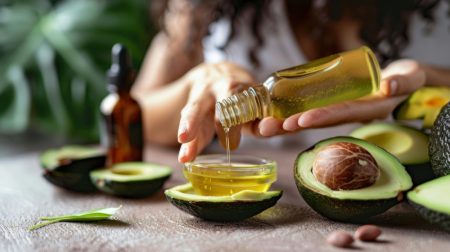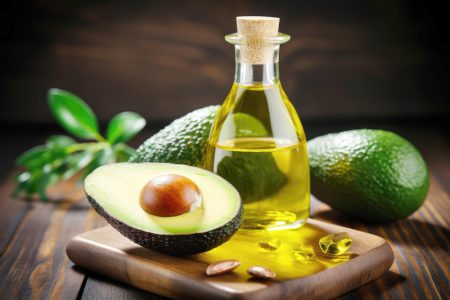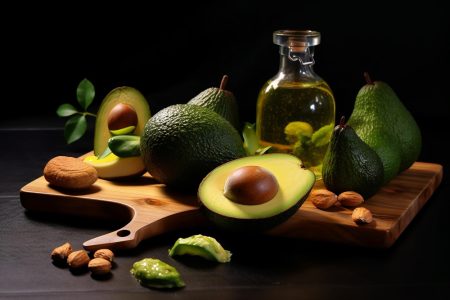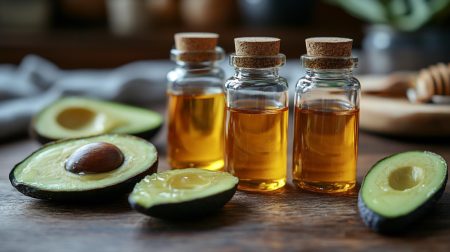Introduction
Heart health is a growing concern for many, especially as we age. Diet plays a pivotal role in managing cardiovascular health, and the types of fats we consume can make a significant difference. While traditional oils like vegetable oil, canola oil, and even butter have been kitchen staples for decades, they may not be the best options for maintaining optimal heart health. As research continues to highlight the importance of choosing healthier fats, avocado oil for cooking has emerged as a heart-friendly alternative worth considering.
Extracted from the flesh of ripe avocados, avocado oil is packed with monounsaturated fats, antioxidants, and essential vitamins that can positively impact cardiovascular function. Unlike oils that are high in saturated fats or processed trans fats, avocado oil supports healthy cholesterol levels and may reduce the risk of heart disease. Its versatility in the kitchen, thanks to its neutral flavor and high smoke point, makes it an excellent substitute for less healthy fats in a variety of cooking methods.
In this post, we’ll explore why avocado oil is a heart-healthy alternative to traditional oils, compare it to commonly used fats, and offer practical tips on how to incorporate this nutrient-rich oil into your daily cooking routine.
Affiliate Disclaimer
Our website may include links to affiliate sites. If you click on an affiliate link and make a purchase, we may earn a small commission or receive other compensation at no extra cost to you. Please note that many of the links on our site are affiliate links. Our use of these links does not impact the products, services, or websites we recommend to you. This disclaimer covers all forms of communication with you, including our website, email, phone, social media, products, and other platforms.
Amazon Affiliate Disclaimer
We participate in the Amazon Services LLC Associates Program, an affiliate marketing program that allows us to earn fees by linking to Amazon.com and its affiliated sites. If you click on an Amazon affiliate link on our site and make a purchase, we may receive a small commission at no additional cost to you.
1. What is Avocado Oil?
How Avocado Oil is Made
Avocado oil is derived from the flesh of ripe avocados, which makes it unique compared to many other oils that come from seeds. The process of extracting avocado oil begins with pressing the fruit's pulp, which is rich in healthy fats and nutrients. Depending on the processing method, avocado oil can be either refined or unrefined.

- Unrefined avocado oil is typically cold-pressed, meaning the oil is extracted without the use of heat or chemicals, preserving much of its nutritional value. It retains a greenish hue and a slightly more robust flavor.
- Refined avocado oil, on the other hand, undergoes further processing to remove impurities, resulting in a lighter color and a more neutral taste. This version of the oil is often preferred for high-heat cooking because of its higher smoke point.
Whether refined or unrefined, avocado oil is valued for its nutritional content and versatility. It’s a fantastic option for a variety of cooking methods, from sautéing to grilling. Avocado oil for cooking provides a rich source of heart-healthy fats that can replace less healthy oils and fats commonly found in the kitchen.
Nutritional Profile of Avocado Oil
Avocado oil is celebrated for its impressive nutritional composition. Unlike many traditional oils that are high in unhealthy fats, avocado oil for cooking is rich in beneficial nutrients that support overall health.
- Monounsaturated Fats: Avocado oil is predominantly composed of monounsaturated fats, particularly oleic acid. These fats are considered the "good" fats, known for their ability to reduce bad cholesterol levels (LDL) and increase good cholesterol (HDL). This balance is crucial for promoting heart health and reducing the risk of cardiovascular diseases.
- Oleic Acid: This omega-9 fatty acid is a primary component of avocado oil, making up about 70% of its fatty acid content. Oleic acid has been extensively studied for its anti-inflammatory properties and its role in lowering the risk of heart disease. It also helps protect against oxidative stress, which can damage cells over time.
- Vitamin E: Avocado oil is a rich source of Vitamin E, a powerful antioxidant that helps protect cells from damage caused by free radicals. This nutrient is essential for heart health, as it supports healthy blood vessels and may reduce inflammation.
- Lutein: This antioxidant, typically associated with eye health, is also found in avocado oil. While it's known for supporting vision, lutein's antioxidant properties may provide additional benefits in protecting the heart from oxidative damage.
The Unique Qualities of Avocado Oil
What sets avocado oil apart from other cooking oils is its ability to retain its nutritional content even when exposed to high temperatures. Many oils break down and lose their health benefits when heated beyond their smoke point, but avocado oil for cooking retains its integrity due to its stable fat composition. This means you can use it for high-heat cooking methods like frying, roasting, and grilling without worrying about the formation of harmful compounds.

In summary, avocado oil is not only versatile but also packed with nutrients that support heart health. Whether you are sautéing vegetables or baking, incorporating avocado oil for cooking into your meals can be a simple yet impactful way to boost your nutrient intake and improve your overall health.
2. Why Avocado Oil is a Heart-Healthy Option
High in Monounsaturated Fats
One of the key reasons why avocado oil is considered heart-healthy is its high content of monounsaturated fats. Unlike saturated fats, which can raise bad cholesterol levels (LDL) and contribute to plaque buildup in the arteries, monounsaturated fats help to lower LDL cholesterol while maintaining or even increasing levels of good cholesterol (HDL). This balance is crucial for overall cardiovascular health, as it reduces the risk of heart disease and stroke.
Incorporating avocado oil for cooking into your meals is a simple way to increase your intake of these beneficial fats. Whether you are sautéing, roasting, or even making a salad dressing, avocado oil provides a heart-healthy alternative to oils that are higher in saturated or trans fats, such as butter, margarine, or lard.

Rich in Oleic Acid
Oleic acid, a type of monounsaturated fat, makes up approximately 70% of avocado oil’s fatty acid content. This omega-9 fatty acid has been extensively researched for its positive impact on heart health. Oleic acid has been shown to reduce inflammation, a key factor in the development of cardiovascular diseases. Chronic inflammation can damage blood vessels and lead to conditions like atherosclerosis, where arteries become clogged with fatty deposits, increasing the risk of heart attacks and strokes.
By using avocado oil for cooking, you can naturally increase your intake of oleic acid, which helps to combat inflammation in the body. Furthermore, oleic acid is known to promote insulin sensitivity, which is beneficial for those at risk of developing type 2 diabetes, another condition closely linked to heart health.
Contains Vitamin E
Avocado oil is an excellent source of Vitamin E, an antioxidant that plays a critical role in protecting cells from oxidative stress. Oxidative stress occurs when harmful free radicals build up in the body, potentially damaging tissues and organs, including the heart. Vitamin E helps neutralize these free radicals, reducing their impact on the body and potentially lowering the risk of heart disease.

Additionally, Vitamin E supports healthy blood vessels by preventing the oxidation of LDL cholesterol. When LDL cholesterol oxidizes, it becomes more likely to stick to the walls of arteries, contributing to plaque buildup. By preventing this oxidation, Vitamin E helps to keep arteries clear and flexible, promoting better blood flow and reducing the risk of blockages.
Free from Harmful Trans Fats
Unlike some processed oils that contain harmful trans fats, avocado oil is naturally free of trans fats. Trans fats are a type of unsaturated fat that has been chemically altered during processing to improve the shelf life and stability of products like margarine, baked goods, and snack foods. Unfortunately, trans fats are highly detrimental to heart health, as they not only raise LDL cholesterol but also lower HDL cholesterol.
By opting for avocado oil for cooking, you can avoid trans fats altogether. This makes it a healthier alternative to processed oils like vegetable shortening, which have been shown to increase the risk of heart disease. In fact, many health organizations recommend eliminating trans fats from the diet entirely, and avocado oil provides an excellent option for those looking to make heart-smart choices in the kitchen.
In conclusion, avocado oil’s high monounsaturated fat content, rich supply of oleic acid and Vitamin E, and absence of harmful trans fats make it a superior option for heart health compared to traditional oils. Incorporating avocado oil for cooking is a delicious and nutritious way to protect your cardiovascular system and support long-term well-being.
3. Comparing Avocado Oil to Traditional Oils
Avocado Oil vs. Vegetable Oil
One of the most common oils found in kitchens is vegetable oil, which is often a blend of different plant-based oils, such as soybean, corn, or canola. While vegetable oil is inexpensive and widely available, it is highly processed, often containing harmful trans fats or high levels of omega-6 fatty acids. Omega-6 fatty acids, when consumed in excess, can contribute to inflammation in the body, which is linked to an increased risk of heart disease.
In contrast, avocado oil for cooking is rich in heart-healthy monounsaturated fats and contains no trans fats or unhealthy omega-6 fatty acids. Avocado oil also retains more of its natural nutrients since it undergoes minimal processing compared to vegetable oil. Additionally, avocado oil has a higher smoke point than most vegetable oils, making it a more stable and healthier option for high-heat cooking methods like frying or grilling.
Avocado Oil vs. Butter and Animal Fats
Butter and animal fats, such as lard and tallow, are traditional fats that have been used in cooking for centuries. However, these fats are high in saturated fat, which has been shown to raise LDL cholesterol levels and increase the risk of heart disease. While some saturated fat can be part of a balanced diet, excessive intake is detrimental to cardiovascular health.

When compared to butter and animal fats, avocado oil for cooking offers a much healthier fat profile. With its high content of monounsaturated fats, avocado oil helps to lower LDL cholesterol and reduce the risk of atherosclerosis, a condition where arteries become hardened and clogged due to plaque buildup. Additionally, avocado oil provides important antioxidants, such as Vitamin E, which are not present in butter or animal fats. Swapping butter or lard for avocado oil in your recipes can help reduce your intake of saturated fats while still delivering rich, flavorful dishes.
Avocado Oil vs. Olive Oil
Olive oil is often considered the gold standard of heart-healthy oils thanks to its high content of monounsaturated fats and antioxidants. Both avocado oil and olive oil share similar health benefits, particularly in promoting cardiovascular health by lowering bad cholesterol and reducing inflammation. However, there are a few notable differences between these two oils.
One key advantage of avocado oil for cooking is its higher smoke point, which makes it more suitable for high-heat cooking methods, such as frying, roasting, and grilling. Olive oil, especially extra virgin olive oil, has a lower smoke point and is more prone to breaking down at higher temperatures, which can lead to the formation of harmful compounds. While olive oil is ideal for dressings, drizzling, or low-heat cooking, avocado oil provides greater versatility in the kitchen without compromising on its health benefits.
Another distinction is in the flavor. Olive oil has a more pronounced, sometimes peppery flavor that can complement certain dishes but may overpower others. Avocado oil, on the other hand, has a mild, neutral taste that makes it suitable for a wider range of recipes, from savory to sweet. This allows you to incorporate avocado oil for cooking without altering the natural flavors of your dishes.
Conclusion: The Healthier Choice
When comparing avocado oil to traditional cooking fats and oils, it becomes clear that avocado oil offers significant health advantages. Its high content of monounsaturated fats, beneficial oleic acid, and essential antioxidants make it an ideal choice for those looking to improve heart health. Unlike vegetable oils that can be inflammatory or butter that is high in saturated fat, avocado oil provides a heart-healthy alternative that doesn’t sacrifice taste or versatility in the kitchen. Whether you’re grilling, frying, or simply drizzling, avocado oil for cooking can easily replace less healthy oils, allowing you to enjoy your favorite dishes while supporting long-term cardiovascular health.
4. Benefits of Avocado Oil in Cooking
High Smoke Point for Versatile Cooking
One of the standout benefits of avocado oil for cooking is its exceptionally high smoke point, which is around 520°F (271°C). The smoke point of an oil refers to the temperature at which it begins to break down and produce harmful compounds, including free radicals. Many traditional oils, such as olive oil or vegetable oil, have lower smoke points, meaning they can degrade more quickly when exposed to high heat, potentially compromising the nutritional quality of your meals.

Avocado oil’s high smoke point makes it ideal for a wide range of cooking techniques, including frying, roasting, grilling, and sautéing. Whether you're searing meats, frying eggs, or stir-frying vegetables, you can be confident that avocado oil will hold up without losing its nutritional benefits or altering the flavor of your dish. This versatility is one of the reasons avocado oil for cooking has gained so much popularity among health-conscious chefs and home cooks alike.
Neutral Flavor for Culinary Flexibility
Another key benefit of avocado oil is its mild, neutral flavor. Unlike stronger-tasting oils, such as coconut or olive oil, avocado oil doesn’t overpower the natural flavors of your ingredients. This makes it an excellent option for a variety of recipes, from savory to sweet. Whether you're making a vinaigrette for a salad, roasting vegetables, or baking, avocado oil enhances your dishes without altering the taste profile.
For instance, in baking, where the flavor of fats like butter or coconut oil can be too pronounced, avocado oil for cooking offers a lighter alternative that allows the flavors of the other ingredients to shine. This adaptability makes it a go-to oil for everything from everyday meals to more delicate culinary creations.
Nutrient Retention Even at High Heat
While many oils lose their nutritional value when heated, avocado oil retains its health-promoting nutrients even when used in high-heat cooking. This is largely due to its stable fat composition, which includes monounsaturated fats that remain intact during cooking.
In addition to its healthy fats, avocado oil is rich in Vitamin E and antioxidants, which support heart health and help protect your cells from oxidative damage. This makes avocado oil for cooking not only a practical choice for high-heat methods but also a nutrient-dense addition to your diet.
Improved Texture and Crispness
For those who enjoy crispy, golden-brown textures in their cooking, avocado oil is an excellent option. Whether you're roasting potatoes or frying chicken, the oil’s high smoke point ensures that your food cooks evenly and becomes perfectly crispy without burning.
Because avocado oil doesn’t break down easily, it contributes to better texture and consistency in your dishes, making it a favorite for those who want healthier yet flavorful fried or roasted foods.
Conclusion: A Multi-Purpose Kitchen Staple
The benefits of using avocado oil for cooking extend far beyond its heart-healthy properties. With its high smoke point, neutral flavor, and ability to retain nutrients at high temperatures, avocado oil is a versatile choice that fits seamlessly into various cooking methods. Whether you’re preparing a quick sauté, frying, or baking, avocado oil delivers flavor, texture, and health benefits, making it a must-have in any kitchen aiming for nutritious and delicious meals.
5. How to Use Avocado Oil in Your Cooking
Sautéing and Stir-Frying
Avocado oil for cooking is a fantastic option when it comes to everyday techniques like sautéing and stir-frying. Its high smoke point and neutral flavor make it ideal for preparing a wide range of vegetables, proteins, and grains without the risk of burning or altering the flavor. When you sauté with avocado oil, you can achieve perfectly cooked ingredients that are tender on the inside and slightly crisp on the outside. Stir-frying at high temperatures is also easier with avocado oil, as it withstands the heat needed to quickly cook your vegetables and proteins while preserving their nutrients.

To incorporate avocado oil into your daily routine, simply use it as a direct substitute for any oil or butter you typically use in your sauté pans. Whether you're making stir-fried vegetables, pan-seared chicken, or scrambled eggs, avocado oil ensures your dishes cook evenly and taste delicious.
Grilling and Roasting
Grilling and roasting often require oils that can handle prolonged exposure to high heat. Avocado oil for cooking is perfect for these methods because of its high smoke point and ability to enhance the crispiness and flavor of your food without breaking down.
When roasting vegetables like carrots, potatoes, or brussels sprouts, a light drizzle of avocado oil before placing them in the oven can help achieve that golden-brown, crispy exterior without making the food greasy. For grilling meats, marinating your cuts with avocado oil will ensure the meat remains tender and juicy while developing a perfectly seared exterior. Additionally, avocado oil’s neutral flavor allows the natural flavors of grilled meats and vegetables to shine through, making it a versatile choice for any recipe.
Baking with Avocado Oil
Baking is another area where avocado oil for cooking can shine as a healthier alternative to butter or traditional oils. Many baked goods, such as cakes, muffins, or quick breads, call for oils that provide moisture without overpowering the flavor of the other ingredients. Avocado oil’s mild taste ensures that it won’t interfere with the sweetness or texture of your baked creations.
You can use avocado oil in place of butter, vegetable oil, or canola oil in most baking recipes. Simply substitute it in equal amounts, and you’ll still achieve moist, fluffy, and flavorful results. Plus, by using avocado oil, you’re adding heart-healthy fats and antioxidants to your treats, making them not only delicious but also nutritious.
Salad Dressings and Marinades
Cold applications, like salad dressings and marinades, are another excellent way to use avocado oil for cooking. Its smooth texture and neutral taste make it a great base for homemade vinaigrettes or as part of a marinade for meats and vegetables. Avocado oil pairs well with a variety of flavors, allowing you to create dressings with citrus, herbs, and spices while providing a nutrient-dense boost to your salads.

To make a simple avocado oil vinaigrette, whisk together avocado oil, balsamic vinegar, mustard, and your choice of seasonings. For marinades, combine avocado oil with garlic, lemon juice, and herbs to infuse meats with moisture and flavor before grilling or roasting.
Conclusion: Versatility in the Kitchen
Avocado oil’s versatility makes it a valuable addition to any kitchen. Whether you’re sautéing, grilling, baking, or creating fresh salad dressings, avocado oil for cooking enhances the flavor and texture of your dishes while offering a healthier alternative to traditional oils. Its ability to withstand high temperatures, neutral flavor, and nutrient-rich profile ensure that you can use it in various recipes, promoting both flavor and heart health in your everyday meals.
6. Where to Find Quality Avocado Oil
Understanding What to Look For in Avocado Oil
When choosing avocado oil for cooking, it’s important to know what factors determine quality. The process by which avocado oil is made can significantly impact its nutritional value and flavor. Opting for the best possible oil ensures that you reap the full benefits in both taste and health.
- Cold-Pressed vs. Refined: The highest quality avocado oil is often labeled as "cold-pressed" or "extra virgin." This means the oil has been extracted without the use of heat or chemicals, preserving its natural nutrients, flavor, and vibrant green color. Cold-pressed avocado oil is unrefined, so it contains more antioxidants, vitamins, and the rich flavor of avocados.
- Refined Avocado Oil: Refined avocado oil has been processed to remove impurities, giving it a lighter color and a more neutral flavor. While it still retains many of its beneficial properties, it may not have as many antioxidants as its unrefined counterpart. However, refined avocado oil is still an excellent option for high-heat cooking due to its higher smoke point. Both cold-pressed and refined varieties of avocado oil for cooking are useful, but the right choice depends on your cooking needs and flavor preferences.
Tips for Choosing High-Quality Avocado Oil
When shopping for avocado oil, there are a few key factors to consider to ensure you’re buying a high-quality product.
- Packaging: Look for avocado oil that comes in dark-colored glass bottles, as this helps protect the oil from light exposure, which can cause it to degrade and lose its nutritional value over time. Avoid oils packaged in clear plastic or glass, as they are more susceptible to oxidation.
- Labeling: Check the label for phrases like “cold-pressed,” “extra virgin,” or “unrefined” to ensure you’re getting the most nutrient-dense version of avocado oil. Additionally, choose products that are labeled as “100% pure avocado oil” to avoid blends that may contain lower-quality oils.
- Organic Certification: Organic avocado oil ensures that the avocados used were grown without the use of harmful pesticides or chemicals. While organic avocado oil for cooking may be slightly more expensive, it can provide peace of mind for those looking to avoid chemical exposure in their food.
Where to Buy Avocado Oil
Once you know what to look for, you can find avocado oil at several types of retailers. Many grocery stores, particularly those that focus on organic or natural products, will stock high-quality avocado oil in their cooking oils section. Stores like Whole Foods, Trader Joe’s, and other health-conscious supermarkets often carry cold-pressed and organic varieties.
For convenience, you can also purchase avocado oil for cooking online through retailers like Amazon and Thrive Market or directly from producers' websites. Buying online gives you access to a wider range of options, including niche brands that specialize in high-quality, minimally processed oils.
Invest in Quality for Maximum Benefits
When it comes to purchasing avocado oil for cooking, investing in high-quality, cold-pressed, and organic products can significantly enhance both the flavor and health benefits of your meals. By knowing what to look for on the label and where to shop, you can ensure that you’re getting the best possible avocado oil for your cooking needs, making your kitchen a hub for heart-healthy, nutrient-rich meals.
Conclusion
Incorporating avocado oil for cooking into your daily routine is a simple yet effective way to promote better heart health while enhancing the flavor and nutrition of your meals. Its high content of monounsaturated fats, particularly oleic acid, combined with antioxidants like Vitamin E, make it a powerful ally in reducing cholesterol levels, fighting inflammation, and protecting your cardiovascular system. Whether you're sautéing, grilling, roasting, or baking, avocado oil’s high smoke point and neutral flavor provide versatility for all types of dishes without compromising on health benefits.
By choosing high-quality avocado oil—preferably cold-pressed and organic—you ensure that your kitchen is stocked with a nutrient-dense, heart-healthy alternative to traditional oils. With its numerous benefits and ease of use, avocado oil is a fantastic addition to any kitchen focused on preparing nutritious, delicious meals that support long-term well-being.


